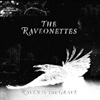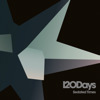 The Raveonettes
The Raveonettes
Raven in the grave
Vice
Every time The Raveonettes put out an album, an all-too-familiar discourse emerges -- some critics think it is a step forward for the band, others posit the new record as further evidence of the band's stagnant sound and production, and a number of reviewers try and tie these disparate opinions together, claiming the newest effort as a creative evolution that maintains the duo's distinct vision. "Lust, lust, lust" was heralded as a triumph, lauded as an intriguing development of the band's unique mix of the influence of '60s surf rock and The Jesus and Mary Chain, and just as often dismissed as 'yet another Raveonettes album' that failed to demonstrate any discernible creative growth. A quick visit to Metacritic and you can see the same thing happening with "Raven in the grave", which surprises me. There are a few places where The Raveonettes stumble on this album (I will not even try and defend the adolescent, throwaway lyrics), but these missteps are easily overshadowed by the duo's exploration of new musical territory. Going against the grain, I'd say "Summer moon", a song that has inspired some very strange negative response in quite a few of the reviews I've read, is one of the album's highpoints, reminding me of the hauntingly reworked '50s pop of "Twin Peaks", and I think it could be argued that the influence of David Lynch and Angelo Badalementi doesn't stop there. The standout for me, however, is "Evil seeds", which channels the talents of The Raveonettes down avenues home to far more shadows than usual. I've always enjoyed the band, though their records don't often hold my attention for very long. In the case of "Raven in the grave", while it took me a few listens to really get into it, I still find myself enjoying some new aspect of a song or two with each listen. It may not rank very high on my Best of 2011 list, but "Raven in the grave" has been a welcome companion the last few weeks, especially as spring seems to have finally arrived.
- Lars Garvey Laing-Peterson
 120 Days
120 Days